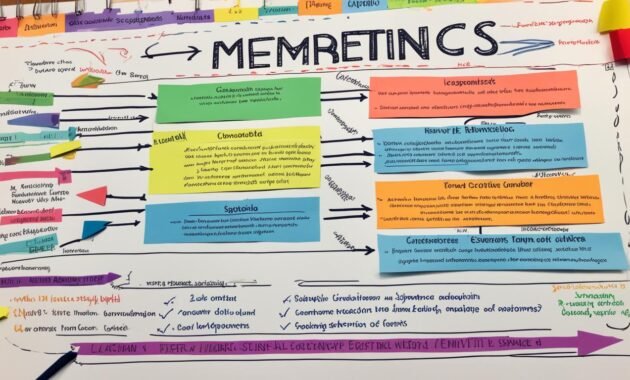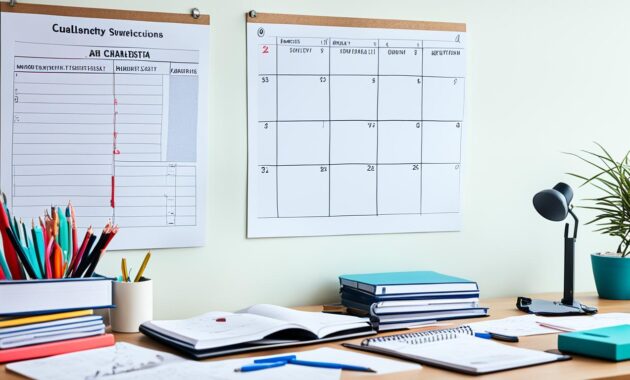Creating a Structuring Your Study Plan For Exams is crucial for achieving success in exams. A well-organized study plan can help you optimize your exam preparation, improve your study habits, and effectively manage your time.
In this article, we will provide you with expert tips and strategies to help you structure your study plan for exams. Whether you are a student preparing for a final exam or a professional studying for a certification test, these tips will help you maximize your chances of success.
By implementing effective study methods, establishing a study routine, and utilizing exam revision techniques, you can enhance your learning experience and feel more confident on exam day.
Key Takeaways:
- Develop a realistic study plan by understanding the exam objectives and setting achievable goals.
- Create a weekly timetable that includes specific time slots for each subject or topic.
- Utilize a variety of study materials and incorporate active learning techniques.
- Regularly review and assess your progress to make adjustments to your study plan as needed.
- Join study groups or communities to collaborate with peers and gain additional insights.
Step-by-Step Guide to Developing a Structured Study Plan
Developing a structured study plan is crucial for effective exam preparation. By following a systematic approach, you can optimize your study schedule and enhance your chances of success. Here is a step-by-step guide to help you develop a well-organized study plan:
1. Understand Exam Objectives
Begin by thoroughly understanding the objectives of the exam. Review the official guidelines and syllabus to gain clarity on the topics and skills that will be tested. This step will help you focus your studies and allocate appropriate time to each subject.
2. Set Realistic Goals
Set realistic goals that align with your abilities and time constraints. Break down your study plan into manageable tasks, such as completing specific chapters or mastering certain skills. This will prevent overwhelm and allow for steady progress.
3. Create a Weekly Timetable
Create a weekly timetable that accommodates your schedule and commitments. Allocate dedicated time slots for each topic or task, ensuring a balanced distribution of study hours. Be mindful of your energy levels and consider peak performance times for subjects that require focus.
4. Utilize Diverse Study Materials
Gather diverse study materials to enhance your understanding and knowledge retention. Use textbooks, lecture notes, online resources, and reputable study guides. Incorporate interactive materials such as flashcards or educational videos to make your learning experience more engaging.
5. Incorporate Active Learning Techniques
Active learning techniques promote deeper understanding and long-term retention. Engage in hands-on practice, solve practice problems, create concept maps, or teach the material to someone else. These active learning strategies will reinforce your understanding and help you apply knowledge effectively.
6. Regular Review and Progress Assessment
Regularly review your study plan and assess your progress. Identify areas where you need more focus and adapt your schedule accordingly. Take practice tests or quizzes to gauge your understanding and make adjustments as needed.
7. Join Study Groups or Communities
Collaborate with peers and join study groups or online communities related to your exam. Engaging with others allows for knowledge sharing, discussion of difficult concepts, and gaining different perspectives. It can provide valuable support and motivation during the study process.
By following this step-by-step guide, you can develop a structured study plan that optimizes your exam preparation. As you progress, remember to stay consistent, remain dedicated, and prioritize both your physical and mental well-being.
Top Tips from Academic Practices for Effective Exam Preparation
When it comes to exam preparation, academic practices offer valuable insights to help you succeed. By incorporating proven techniques into your study routine, you can maximize your learning potential and improve your exam performance. Here are some top tips to consider:
- Utilize the Pomodoro Technique: This time management method involves breaking your study sessions into focused intervals, typically 25 minutes, followed by a short break. This technique helps maintain concentration and prevents burnout, ensuring efficient use of your study time.
- Create a Visual Study Schedule: Designing a visual study schedule provides a clear overview of your plan and helps you stay organized. It allows you to allocate specific time blocks for each subject or topic, ensuring a balanced and effective study routine. Consider using online tools or physical planners to create your schedule.
- Teach the Material: One of the most effective ways to reinforce your understanding of a subject is by teaching it to someone else. Whether it’s explaining concepts to a study partner or creating study guides for yourself, teaching helps solidify your knowledge and identify areas that need further clarification.
- Prioritize Difficult Topics: Tackling challenging topics first can prevent procrastination and ensure that you allocate sufficient time and effort to master them. By addressing difficult subjects early on, you’ll have more time for review and practice, increasing your chances of success.
- Utilize Multisensory Learning: Engaging multiple senses during study sessions can enhance knowledge retention and understanding. Combine different learning styles, such as reading with visual aids, watching educational videos, or engaging in hands-on practice. This multisensory approach caters to different learning preferences and reinforces learning through various channels.
By incorporating these tips into your exam preparation, you can optimize your study sessions and improve your overall performance. Experiment with different strategies and find the ones that work best for you. Remember, effective preparation is key to achieving your academic goals.

How to Create an Effective Study Guide for Exams
A study guide is a crucial tool for exam preparation, providing structure and focus to your study sessions. Follow these expert tips to create an effective study guide that will help you ace your exams.
Organizing Your Notes: Start by organizing your notes in a way that makes sense to you. One popular method is the summary sheet technique, where you condense your study material into concise summaries on a single sheet of paper. This method helps you consolidate information and facilitates easier review.
Expert Tip: To make your study guide even more organized, use headings, bullet points, and subheadings to categorize and highlight key information. This will make it easier for you to navigate your study guide and find specific topics quickly.
Practice Essay Questions: To prepare for possible essay prompts, practice writing essay responses. This will help you develop your thoughts, improve your writing skills, and familiarize yourself with the expected format and structure of essay answers.
| Benefits of Practice Essay Questions | How to Incorporate Practice Essay Questions |
|---|---|
|
|
Make a Vocabulary Section: Create a dedicated section in your study guide to focus on key terms and definitions. Include a glossary of important vocabulary words related to your subjects. This will help you reinforce your understanding of the terminology and ensure that you can effectively communicate your knowledge in your exams.
Handwriting vs. Typing: While both handwriting and typing have their merits, handwriting can enhance retention and understanding. If you choose to type your study guide, make sure to print it out for better absorption. Experiment with both methods to determine which one works best for you.
Expert Advice:
Make It Personal: Your study guide should reflect your learning style and preferences. Tweak your study guide by including mnemonic devices, using colors or symbols, or adding personal anecdotes related to the topic. Making your study guide more personal will make it easier to remember and engage with the material.
Create an effective study guide by organizing your notes, practicing essay questions, making a vocabulary section, and personalizing it to suit your preferences. With a well-structured study guide, you’ll feel more confident and prepared when facing your exams.

Importance of Study Schedules for MCAT Exam Preparation
When it comes to preparing for the MCAT exam, having a well-structured study schedule is crucial. A study schedule provides a roadmap for your preparation, helping you stay organized and focused on your goals. It ensures that you cover all the necessary topics and allocate sufficient time to each subject.
One of the key benefits of a study schedule is that it allows you to assess your knowledge and identify weak areas. By designating specific study sessions for different topics, you can gauge your understanding and focus on improving areas where you struggle. This targeted approach ensures that you maximize your study time and address any knowledge gaps effectively.
In addition, a study schedule helps you set realistic study goals. By breaking down the content of the MCAT exam into manageable chunks, you can set specific objectives for each study session. This helps you stay motivated and progress steadily towards your ultimate goal of success on the MCAT.
Choosing the right study materials is another critical aspect of effective MCAT preparation. A study schedule allows you to allocate time for researching and selecting high-quality resources that align with the structure and content of the MCAT exam. Investing in trusted study materials enables you to study efficiently and effectively, maximizing your chances of achieving a high score.
Furthermore, a study schedule nurtures the habit of regular study sessions. By dedicating specific time slots for studying, you establish a routine that promotes consistency and discipline. Making time for study sessions ensures that your preparation remains on track and prevents procrastination or cramming at the last minute.
To create an effective study schedule for the MCAT exam, it’s essential to understand the structure and content of the exam. Familiarize yourself with the different sections, question types, and the weightage given to each topic. This understanding allows you to allocate appropriate study time to each subject and develop a comprehensive study plan.
| Benefits of a Study Schedule for MCAT Exam Preparation | |
|---|---|
| 1. Provides structure and organization to your preparation | |
| 2. Helps assess your knowledge and identify weak areas | |
| 3. Sets realistic study goals | |
| 4. Guides in choosing the right study materials | |
| 5. Establishes a regular study routine |

In conclusion, a study schedule plays a vital role in MCAT exam preparation. It provides structure, helps assess your knowledge, sets realistic goals, guides material selection, and establishes a regular study routine. By creating an effective study schedule and following it diligently, you can optimize your preparation and increase your chances of success on the MCAT.
Strategies for Effective Time Management During MCAT Prep
Designing a Flexible Study Plan
Designing a flexible study plan is crucial for effective time management during MCAT preparation. By creating a plan that allows for adaptation and revision based on your progress, you can optimize your study time and focus on areas that require additional attention.
Utilizing Technology Tools
Technology tools can greatly enhance your preparation for the MCAT. Utilize online resources, such as interactive practice tests, video lectures, and mobile apps, to supplement your study materials. These tools not only provide convenience but also offer a variety of learning methods that cater to different learning styles.
Monitoring Progress and Adjusting the Schedule
Regularly monitoring your progress is key to effective time management. Use study trackers or apps to keep track of your study hours and progress in each topic. By evaluating your performance, you can identify areas of improvement and adjust your study schedule accordingly, ensuring that you allocate more time to challenging subjects.
Creating a Balanced Routine
A balanced routine is essential for maintaining focus and preventing burnout during MCAT prep. Alongside your study sessions, schedule time for rest, exercise, and self-care activities. Taking breaks and engaging in activities that help you relax and recharge will improve your overall performance and well-being.
“Effective time management is the key to success in any task, especially during MCAT preparation. By diligently designing a flexible study plan, utilizing technology tools, monitoring progress, and creating a balanced routine, you can optimize your study time, enhance your understanding, and perform at your best on the MCAT.” – Dr. Emily Rodriguez, MCAT Prep Expert

Having a comprehensive study plan coupled with effective time management strategies will allow you to make the most of your preparation time and increase your chances of success on the MCAT.
How to Prepare for Test Day: Final Review and Test-Taking Strategies
Preparing for test day is a crucial part of exam preparation. It’s important to dedicate time to reviewing all the tested topics and skills to ensure you are well-prepared. In addition to the final review, there are certain strategies you can employ to boost your confidence and maximize your performance on test day.
Final Review
Before the big day arrives, it’s essential to go over all the material you have studied. Use your study guide and notes to refresh your memory on key concepts, formulas, and theories. Take the time to review any practice exams or questions you have completed to identify any areas where you may need further clarification or practice.
“The final review allows you to reinforce what you have learned and identify any weak points that need extra attention. It’s a chance to solidify your understanding and fill in any gaps in your knowledge.” – Dr. Jane Johnson, Exam Preparation Expert
During the final review, consider utilizing flashcards or other mnemonic techniques to help you remember important information. Create a study schedule that focuses on specific topics or subjects each day to ensure you cover everything systematically.
Confidence-Boosting Techniques
Confidence plays a significant role in test-taking. When you feel confident, you are better able to recall information and perform well under pressure. Here are some techniques to boost your confidence on test day:
- Visualization: Spend a few minutes each day visualizing yourself in the test environment, answering questions with ease, and feeling confident and relaxed.
- Positive Self-Talk: Replace negative thoughts and self-doubt with positive affirmations. Remind yourself of your capabilities and past successes.
- Deep Breathing: Practice deep breathing exercises to help calm your nerves and increase focus and concentration.
Test-Taking Strategies
Knowing how to approach different question types and manage your time effectively can significantly impact your test performance. Here are some essential test-taking strategies to keep in mind:
- Read the Instructions Carefully: Take the time to read and understand the instructions for each section of the exam to avoid any unnecessary mistakes.
- Skim the Entire Test: Before diving into the questions, quickly skim through the entire test to get an overview of what’s to come.
- Focus on Easy Questions First: Start with the questions you find easiest to build momentum and gain confidence before tackling the more challenging ones.
- Manage Your Time: Keep an eye on the clock and allocate your time appropriately to ensure you have enough time to answer all the questions.
- Guess Strategically: If you’re unsure about an answer, make an educated guess rather than leaving it blank. Eliminate any obviously wrong options and select the best possible choice.
By incorporating these final review tips and test-taking strategies into your exam preparation routine, you can feel more confident and ready to face test day with success.
Common Mistakes to Avoid When Creating a Study Schedule
When it comes to creating a study schedule, there are several common mistakes that students often make. These mistakes can hinder their success and impact their overall performance in exams. By being aware of these pitfalls, you can avoid them and maximize the effectiveness of your study plan. Let’s explore some of the most common mistakes:
- Underestimating Time and Effort: One of the biggest mistakes students make is underestimating the time and effort required to effectively study for exams. It’s crucial to allocate enough time for each subject and topic, ensuring thorough understanding and retention.
- Overloading Schedule: Another common mistake is overloading the study schedule with too many tasks and activities. While it’s important to challenge yourself, overwhelming yourself with an unrealistic workload can lead to burnout and lack of focus.
- Neglecting Health: A healthy body and mind are essential for optimal studying. Neglecting physical and mental health can have adverse effects on your learning capacity and performance. Be sure to prioritize sleep, nutrition, exercise, and relaxation in your schedule.
- Relying Too Much on Passive Learning: Passive learning, such as reading textbooks or watching lectures, has its place, but it should not be the sole focus of your study plan. Actively engaging with the material through practice questions, discussions, and hands-on activities promotes deeper understanding and retention.
- Inflexibility: Being too rigid and inflexible with your study schedule can lead to unnecessary stress and missed opportunities for improvement. Allow for some flexibility in your plan to adjust for unexpected events or changing priorities.
By avoiding these common mistakes, you can create a study schedule that is well-balanced, effective, and conducive to learning. Remember, the goal is to optimize your study routine and make the most of your preparation time.
Also Read:- Unveiling The Crucial Role Of Exams In Education

Expert Tip:
“An effective study schedule is not just about dedicating hours to studying but also about how you utilize that time. Incorporating active learning techniques, taking breaks, and prioritizing self-care are essential for maintaining focus and improving retention.” – Dr. Sarah Johnson, Education Specialist
Conclusion
Structuring your study plan for exams is critical to optimizing your preparation and achieving success. By following a well-designed study schedule, setting realistic goals, utilizing effective study methods, and managing your time effectively, you can significantly improve your exam performance.
Key takeaways from this article include prioritizing your health and well-being throughout the study process and incorporating active learning techniques such as hands-on practice and teaching the material to reinforce your understanding. You should also consider joining study groups or online communities to collaborate with peers and gain valuable insights.
Remember, creating an optimal study schedule requires understanding the exam objectives, breaking down your plan into manageable tasks, utilizing diverse study materials, and regularly reviewing and adjusting your study plan based on progress. By implementing these strategies, you can enhance your exam preparation and maximize your chances of success.
FAQs
Q: What are some tips for creating a study plan?
A: To create a study plan, first analyze your current schedule, evaluate how much time you can dedicate to studying, and consider your learning style. Then, develop a schedule that sets aside dedicated time for studying, set reminders, and make changes as needed.
Q: How can the pomodoro technique help with studying?
A: The pomodoro technique involves studying for a set amount of time (e.g., 25 minutes) and then taking a short break. This method can help improve focus and productivity by breaking study sessions into manageable intervals.
Q: Why is it important to commit to a study plan?
A: Committing to a study plan helps you stay on track, manage your study time effectively, and ensure you allocate enough time to cover all necessary material. It also helps you build a routine and develop good study habits.
Q: How can I schedule my study sessions effectively?
A: To schedule your study sessions effectively, consider your course load, assignment deadlines, and other commitments. Use a calendar to plan study sessions around your classes, work, and personal activities.
Q: What are some ways to find time to study during a busy schedule?
A: To find time to study in a busy schedule, consider cutting back on non-essential activities, setting aside dedicated study time, and being receptive to studying during short breaks or commute times. It may also help to prioritize studying over less important tasks.
Q: How can setting reminders help with managing study time?
A: Setting reminders can help you stay organized, remember important study sessions, and stay on track with your study plan. Reminders can be in the form of alarms, calendar notifications, or to-do lists.
Q: Why is it important to analyze and evaluate your current study habits?
A: Analyzing and evaluating your current study habits can help you identify areas for improvement, understand how you learn best, and make necessary adjustments to increase your productivity and efficiency in studying.
Source Links
- https://www.linkedin.com/pulse/crafting-comprehensive-study-plan-salesforce-tbuse?trk=organization_guest_main-feed-card_feed-article-content
- https://www.herzing.edu/blog/how-create-successful-study-guide
- https://www.joinleland.com/library/a/how-to-create-an-effective-mcat-study-schedule-a-step-by-step-guide-to-maximizing-your-preparation